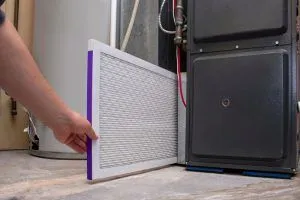
Your furnace is one of the most important components in your home. It keeps you comfortable even on the coldest winter days and helps provide a safe, healthy environment for you and your family.
You need to ensure that your furnace is regularly maintained for it to operate efficiently for many years to come, just like the other major systems in your home, such as your refrigerator and HVAC ducts.
What Is the Average Lifespan of a Furnace?
Furnaces are expensive appliances to replace, and most people would prefer to keep their furnace for as long as possible. However, it is important to know how long your furnace will last so you can plan for its replacement.
Most furnaces last 20 to 25 years, but some may last longer. A furnace that is well-maintained and installed by a professional can usually last longer than one that has been poorly maintained or installed by an amateur.
There are many factors that can affect how long your furnace will last. The most important factor is the quality of the components used in manufacturing. A quality furnace will last longer than an inferior model and will cost less in repairs over time.
Factors Affecting Furnace Lifespan
The condition of your furnace is one of the biggest factors that can affect its lifespan. If you have an older furnace, or one that hasn’t been maintained properly, it’s likely to break down sooner than a newer one that’s been regularly serviced and maintained.
Older furnaces also tend to be less energy efficient than newer models, which can increase your heating bills and reduce the lifespan of your furnace.
If you’re in the market for a new furnace, look for one with an Energy Star rating from the U.S Department of Energy. These products have been shown to use less energy and provide better overall performance than conventional models.
The life expectancy of a furnace depends on several factors including:
Age of the Unit
Older furnaces tend to have more issues than newer ones. This is due to age-related wear and tear, as well as decreased efficiency over time. If your furnace is older than 10 years, it may be time for an upgrade.
Type of Fuel
The type of fuel you use also affects how long your furnace will last. Natural gas furnaces tend to last longer than propane or oil units, although there are exceptions. If you use natural gas, make sure your system has an annual inspection by an expert technician who can ensure that everything is working properly and safe for continued use.
Oil-fired furnaces have a longer lifespan than electric or gas models (provided they are properly maintained). This is due to their ability to stand up against corrosion better than other types of heating systems. Also, oil-fired systems tend to be built better than other types (especially electric) which means they won’t need repair as often or at all!
Quality of Installation
A poorly installed or improperly sized system will undoubtedly malfunction sooner than later because it wasn’t built with longevity in mind. The installer will be able to assess your home and determine what size system is needed for optimal comfort.
In addition to taking into consideration the layout of your home, they will also consider the quality of your insulation as well as air leakage. Taking these steps will ensure that your heating system will continue to function effectively for many years to come.
Maintenance History
A well-maintained heating system will last longer than an under-maintained one — this much we know from experience. If you haven’t had regular maintenance performed on your furnace since installation, then chances are good that it needs replacing immediately.
As part of regular maintenance, your heating contractor should be inspecting and cleaning the air filters in your home’s furnace, checking for any signs of wear and tear, and providing any necessary repairs. If you haven’t had regular maintenance performed on your unit since installation, then chances are good that it needs replacing immediately.
How do I Know When My Furnace Needs Replacing?
Unfortunately, there’s no magic number that tells you when it’s time to replace your furnace – just like with cars, some things just run their course eventually. The first sign that your furnace might need replacing is if it’s making noise.
If you hear an unusual humming or rattling noise coming from your furnace, it might be time to have it checked out. This could be caused by a number of things including faulty parts or worn-out components.
Another sign that your furnace needs replacing is if it isn’t heating your home evenly. If one area of your house seems colder than others, this could be a sign that something is wrong with the heat distribution system inside your furnace.
If you’re unsure whether your furnace needs to be replaced, contact us for an appointment.



